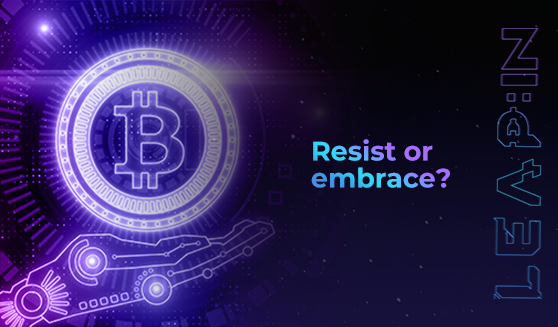
Knowledge, insights, and predictions for the future. Discover our weekly pick of quotes from speakers at #LEAP22 – you’ll click out of this email feeling just a little wiser.
subscribe
This week we’re quoting…
Ziad Al Yousef (Deputy Governor for Development and Technology at Saudi Central Bank)
What Al Yousef said:
“While the new technology and the digital era of money allows us to address the traditional frictions of the monetary system, let’s not forget that at the centre of money is the trust between the buyer and the seller.”
Trust is the foundation of money
If you’ve never read the late anthropologist David Graeber’s work, we recommend it. In his 2011 book Debt: The First 5,000 Years he wrote:
“…the value of a unit of currency is not the measure of the value of an object, but the measure of one’s trust in other human beings.”
Banks know this
Look at any bank’s marketing content and you’ll find the word trust. You’ll probably find it quite a few times. Because banks know that trust is their only real selling point – the only way to differentiate themselves from the competition. The bank that people trust the most will be the bank that makes the most money.
Blockchain creators know this too
The people behind blockchain tech, and the companies that are creating blockchain-based cryptocurrencies, also know that trust is the deciding factor when it comes to whether or not people will use a currency.
It’s why blockchain has been called the new technology of trust (Goldman Sachs), a confidence machine (Technology in Society), the new architecture of trust (Kevin Werbach). And it’s why the very structure of blockchain is widely discussed in terms of its trustworthiness and/or transparency: even when it’s framed as the anti-trust economic system, requiring no faith in a human being because the technology lays everything bare, trust is still at the heart of the conversation.
So it’s a tech vs human race
Al Yousef was talking about trust in the context of central bank digital currencies (CBDCs). The argument from the central banks is that they’re better placed to develop digital currencies for the new digitised era, because people already trust them. They already have years worth of evidence to prove they can look after people’s economic interests.
From the blockchain/crypto side, the argument is that the technology is inherently trustworthy – because it’s transparent and doesn’t actually require anyone to trust it on its word, and also because the tech doesn’t want anything. It’s just doing what it was made to do with no desire for wealth or power or applause.
In the race to win global favour as the digital currency of choice, then, it’s a race between those who think we can only trust humans/institutions, and those who think we can only trust transparent tech.
What do you think?
Cryptocurrencies are decentralised. CBDCs will be centralised.
Cryptocurrencies enable anonymity. CBDCs will enable central banks to know exactly who has what currency.
Cryptocurrencies can hold investment value, appreciating or depreciating depending on market factors. CBDCs won’t have investment value in their own right (in the same way that one dollar isn’t, in and of itself, an investment that could make you rich).
CBDCs might run on blockchain tech – but they’ll be on permissioned (private) networks, not decentralised (public) networks. So they won’t be transparent. Central banks will keep transactions private.
That is, more or less, how they compare. Where do you stand?
Watch the video: Ziad Al Yousef on CBDCs
Read the blog: Why central banks are creating digital currencies
And…
Pranav Vempati (CEO at MakersHive – KalBionics)
What Vempati said:
“What I actually feel is all these new technologies, most of them are able to penetrate the first one billion. But the remaining seven billion people are still untouched.”
Which new technologies?
Vempati was talking about health tech, and assistive devices specifically. But this point can be applied to tech in other sectors too: new technologies are rarely rolled out for the benefit of the entire world’s population all in one go.
There are loads of reasons for this, and at LEAP we’re pretty loud about the fact that we think tech needs to be more inclusive – inclusive by design, inclusive in its marketing, and inclusive in its affordability.
Here though, we want to take a quick look at one reason why tech often doesn’t touch as much of the population as its creators want it to. It’s a reason that’s especially important in health tech but, again, applies to almost all sectors.
It’s the resistance of tech amongst potential new users.
Why do people resist new tech?
What a question. The reasons are as complex and varied as human beings as a species; but there’s one argument that we think is really interesting, and worth taking on board if you’re trying to introduce a new tech service or product to a new user group.
It’s that society is more likely to reject new tech if it’s a substitute for humanity, rather than designed to augment humanity.
In more detail…
Kenyan scientist and academic Calestous Juma wrote in his book Innovation and its Enemies that our sense of what it means to be human is why we resist some new tech.
In short, we don’t want to be replaced. We want to be supported. And when we feel like technology is replacing a part of our humanity, and making us redundant in some way (no matter how small of a way), we’re more likely to resist it.
So, why is this important? Because if the tech industry creates tech with an understanding of this, then innovators and companies are more likely to create tech that supports the human experience – and more likely to market that tech to resistant populations with a sense of sympathy, and empathy.
Instead of saying:
“This tech can do everything you can do, but better and faster and more!”
The industry can say:
“This tech can create the time and space for you to be better and more fulfilled!”
Perspective matters. Marketing angles matter. And resistance to tech can be eased when the humanity of humans is respected.
subscribe








